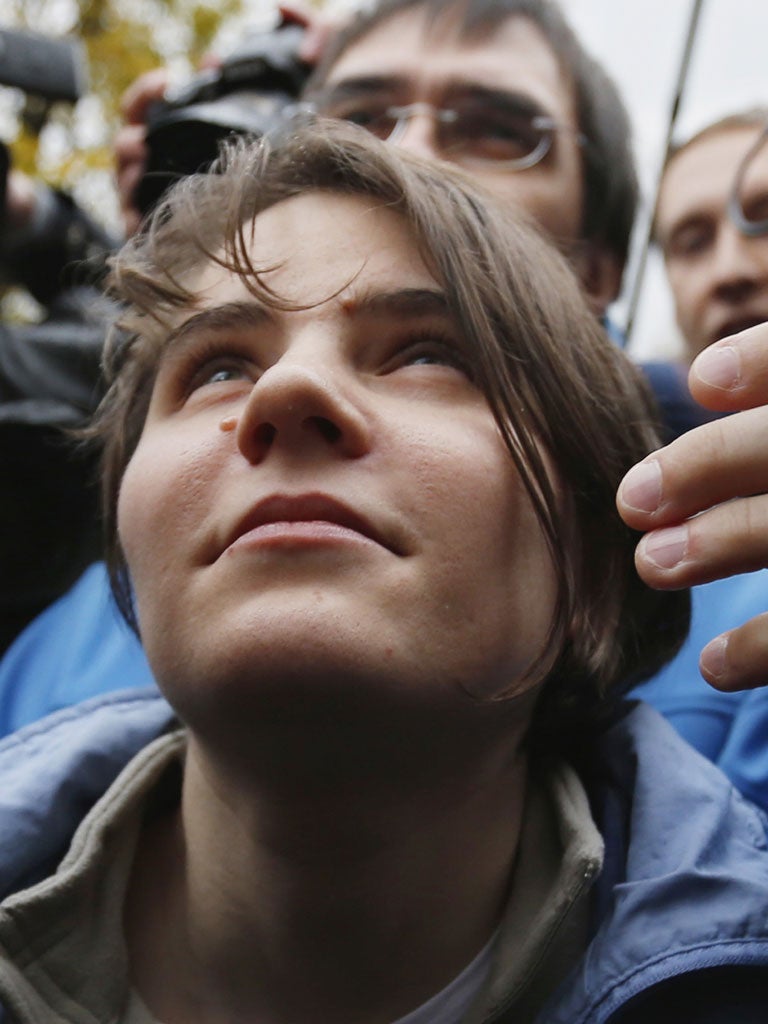'We're not going to stop': No let-up for Putin from freed Pussy Riot member
Russian media suggest that authorities are attempting to 'divide and rule' by releasing activist

The recently freed member of the Russian punk band Pussy Riot has denied rumours of a split within the trio who stood trial and vowed to continue her opposition to President Vladimir Putin.
Yekaterina Samutsevich, 30, was set free in a surprise ruling on Wednesday, after she pleaded during her appeal that she had not fully taken part in the "punk prayer" that led to her and her two co-defendants being jailed for two years in August.
Maria Alekhina, 24, and Nadezhda Tolokonnikova, 22, both had their two-year sentences confirmed by the appeal court and will be sent to prison camps in the coming days.
"I have mixed feelings," Ms Samutsevich said in a television interview shortly after her release. "Of course I'm very happy to be out and free, but I'm very upset that Nadya and Maria are still incarcerated."
After the judge ruled that Ms Samutsevich was released on Wednesday, she shared emotional hugs with the other two women, who appeared pleased to see her let free.
The Russian blogosphere, however, erupted in criticism for Ms Samutsevich and the Pussy Riot lawyers, with some suggesting that the ruling had been a cunning attempt by the authorities to create tension between the band members. "Which new game exactly have our authorities begun?" asked the newspaper Moskovsky Komsomolets on its front page. "Are we once again talking about an attempt to apply the time-honoured formula 'divide and rule'?"
Ms Samutsevich had fired her initial lawyers for the appeal and her new lawyer used a different line of defence, stating that Ms Samutsevich was stopped by security before she could properly take part in the "punk prayer". The judge agreed and commuted the sentence.
The three defendants have said all along that their brief February performance in Moscow's Christ the Saviour Cathedral was political in nature. They rushed into the cathedral wearing bright balaclavas and leggings, danced, played air guitar and later released a video of the stunt dubbed with lyrics criticising the Orthodox Church, its patriarch and Mr Putin. The court decided that the act constituted "hooliganism motivated by religious hatred".
Yesterday, Ms Samutsevich vowed that the controversial performances would continue, even though she risks having her suspended sentence come back into force if she falls foul of the law again. "Of course we are not finished, nor are we going to end our political protest," she said. "We have to make sure they do not learn about the concerts ahead of time, so that we won't be caught and jailed. We'll have to somehow deceive the authorities in a clever way."
Many have seen the Pussy Riot case as symbolic of a crackdown on dissent since Mr Putin returned to the Kremlin in May. Just before the appeal court sat, Mr Putin publicly praised the harsh sentence, saying the women had "got what they asked for".
Ms Samutsevich claimed the verdict had been handed down from above. "You can see the flaws of the judicial system in Russia," she said after her release. "It depends very much on the opinion and the stance of the President." She referred to the Russian justice system as a "mega-authoritarian project of one single individual".
The appeal judges took the unusual step of defending their verdict publicly yesterday and denied that there had been any pressure put on them from above. Larisa Polyakova, the presiding judge, said that while Ms Samutsevich was freed due to "her level of participation" in the "crime", the other two women still posed a threat to society. "The court has considered all the circumstances of the case and the level of danger to society."
Subscribe to Independent Premium to bookmark this article
Want to bookmark your favourite articles and stories to read or reference later? Start your Independent Premium subscription today.

Join our commenting forum
Join thought-provoking conversations, follow other Independent readers and see their replies